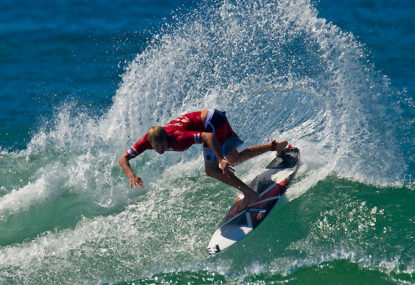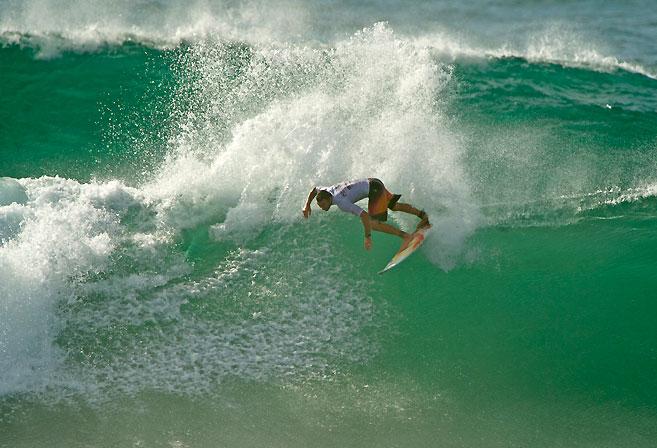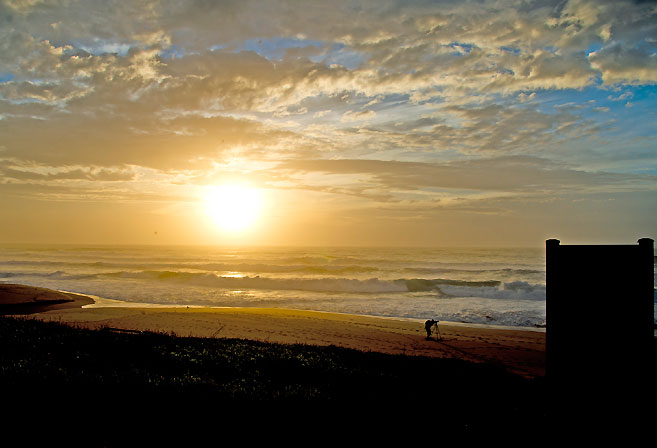JackJumpers' NBL title was special - but where does it sit among Tasmania’s top ten sporting moments?
It’s a pretty good time to be a Tasmanian sports fan right now. After years in the sporting wilderness with not much to celebrate,…

After bursting onto the Australian surfing scene 29 years ago, Newcastle’s Surfest remains one of the sport’s premier events in the country.
With a coastline that stretches from Port Stephens’ Box Beach to Catherine Hill Bay in the south, the Hunter Region’s coastline has long been synonymous with surfing.
Yet the city remained without a major international surfing event to rival the likes of Bells Beach and Manly, which began hosting contests in the early 1960s, right through the sport’s emergence into the mainstream in the mid-1970s.
It wasn’t until the mid-1980s following Mark Richards’ four-straight ASP World Tour titles from 1979-1982 that Newcastle’s surfing powerbrokers began to think about making their vision of an international event a reality.
Backed by two of the city’s major institutions at the time, BHP and NBN Television, the BHP Steel International burst onto the scene in 1985 as the world’s richest surfing event at the time with a purse of over $100,000.
The groundswell of support was immediate, according to Surfest organiser Warren Smith, who has been at the helm of the event throughout its 29-year history.
“The turnout was incredible,” he said.
“The response of the community to come and watch the event and to support Mark Richards in his quest to win the event was absolutely fantastic.
“I’d say there would have been 20 to 30 thousand people there back on that November day in 1985.”
In addition to the turnout on Newcastle Beach, NBN Television broadcasted the full two-day event live, which further boosted the initial momentum of the event.
The buildup that Surfest organisers had generated out of the water was matched by the quality of surfers in it.
The inaugural final saw American Tom Curren, who would go on to become ASP World Champion that year, beat out South African Shaun Tomson in the final to become Surfest’s first winner.
Tomson had beaten two-time defending ASP World Champion Tom Carroll in the semi-final, while Curren progressed ahead of a baby-faced 19-year-old named Mark Occhilupo, who would go on to win surfing’s ultimate crown in 1999.
Both Occhilupo and Carroll would return to Newcastle to win Surfest – twice. Occhilupo claimed the title the following year and won again in 1998, while Carroll was triumphant in 1987 and 1989.
Six of the first seven Surfest titles were claimed by former, current or future world champions.
It’s a tradition that has been carried throughout Surfest’s history, right up until 2012 ASP World Champion Joel Parkinson’s victory in 2013.

Former ASP World Champion Joel Parkinson surfing in Newcastle Harbour at Surfest 2013 (Image: ASP Australasia Media)
He became the eighth world champion to win the event, following in the footsteps of Curren, Occhilupo, Carroll, Damien Hardman, Barton Lynch, Mick Fanning and Kelly Slater.
Yet Surfest is more than just one event. In 2014 the men’s event, now known as the Burton Toyota Pro, sits alongside the Hunter Ports Women’s Classic as ASP six-star events and the Hunter Business Boardriders Pro Junior as international events.
With eight other contests making up the 14-day festival of surfing, Smith believes Surfest stands alone as the city’s major international sporting event.
“I don’t think there’s another annual sporting event running for 29 years on an international stage in this region,” he said.
“The direction that we’ve had pretty much since the early 90s when we really saw what Surfest could be, is to provide a career path for young Newcastle, and Australian surfers.
“For both boys and girls we have an under-14s under-16s and under-21 events as the platform into star-rated events.
Along with the annual Mattara Surfing Classic, a local competition that has now been running for 52 years, Surfest is without doubt the centrepoint of Newcastle’s tightly knit surfing community, from grommets right through to veterans.
Newcastle is a surfing nursery that has produced the likes of Matt Hoy, Luke Egan, Simon Law and Nicky Wood, and young guns Ryan Callinan, Craig Anderson, Jake Sylvester and Philippa Anderson are evidence of the tradition continuing.
“What we see is young kids coming through at nine and ten years of age and they’ll surf all the way through and be still be surfing in the main event in their late 30s,” he said.
“One example of this is Glen Hall, who won the 2010 event at 28 years of age, and he had been coming here since he was 10,” he said.
“He surfed as a cadet, he surfed as a junior and then went on to win the main event.”
The face of the event has changed in recent years. Surfest moved permanently from Newcastle to Merewether Beach in 2007 after being temporarily transferred in 2006 thanks to a heavy southerly swell.
Like many surfing events across the globe Surfest was hit by declining sponsorship revenues in recent years and in 2010 looked like losing its marquee women’s event.
But unlike other events, such as Gold Coast’s Burleigh Pro, the event was able to survive thanks to the city’s financial white knight at the time, Nathan Tinkler, stepping in.
“The women’s event would not have been on except for Nathan Tinkler and the Hunter Sports Group, simple as that,” Smith said.
“I can’t speak for everybody in the community, but we were pretty shattered that we weren’t going to be able to present the event.
“Coming out the other side has definitely added character; we had to struggle hard to present it and were able to successfully present it but I’m confident the event has only gotten stronger.”
Next Sunday the likes of Parkinson, Dane Reynolds and and Brazilian Adrian de Souza line up in the men’s event while current world number three Sally Fitzgibbons and five-time world champion Stephanie Gilmore take part in the women’s event.
As one of only two six-star events in the country, Surfest will also see some of Australia’s brightest talents come to the city in the hope of earning all-important qualification points and qualifying for the World Championship Tour.
It’s hard to argue against the conviction of Smith when he underlines just what Surfest means to the city.
“I can only see Surfest growing further,” he said.
“It’s important that events like this in Newcastle continue to come together; sporting and cultural events like this are what I call the fibre of the community.
“It brings a lot of different people, a lot of different skills and a lot of different personalities together, and people take a lot of pride in that.”
“Seeing the energy that is created by so many different people coming through is just as important as presenting the event itself, and Newcastle needs that.”

Surfest moved permanently to Merewether Beach in 2007 (Image: ASP Australasia Media)
To find out more about the month of sport in Newcastle and the Hunter, click here.